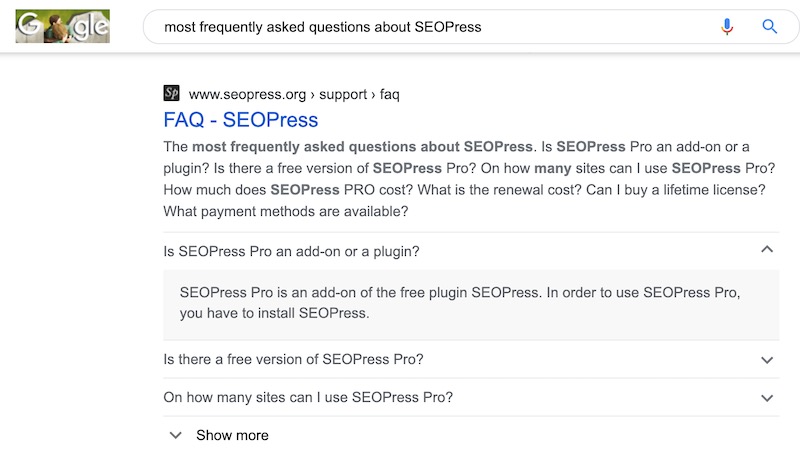Here’s the first long-awaited article in a series of schemas (or structured data) tutorials to understand what schemas are, how to use them with SEOPress to maximize your SEO. Feel free to bookmark, share and comment this article!
Download the Ebook – Master Google Structured Data Types (schemas)
What’s Structured Data ?
Structured Data (or Data Schema) allow you to classify content using a normalized method. There are many schemas that you can use. The best known, and most used, are Product, Article, LocalBusiness, FAQ and Video.
These are defined on the official website schema.org created by Google, Microsoft, Yahoo and Yandex. The site gives a complete list of schemas, each with a set properties and possible values.
However, we suggest that you consult Google’s list of suggested structured data, because it may be a waste of time adding schemas that won’t be used by Google.
In a schema’s set of properties, some are required (and therefore compulsory) and other are simply recommended. If you don’t enter values for required properties, your structured data won’t be used by Google. Adding values to recommended properties can help improve your chances of the structured data being used, but only fill in these properties if you really have appropriate content.
But what does it look like concretely?
Here is an example of markup for the Organization schema taken from our Home Page. This schema uses the JSON-LD format and is visible uniquely in the source code of the page:
<script type="application/ld+json">{"@context" : "https://schema.org","@type" : "Organization","logo": "https:\/\/www.seopress.org\/wp-content\/uploads\/edd\/2018\/12\/SP-carre-couleur.png","name" : "SEOPress","url" : "https:\/\/www.seopress.org","sameAs" : ["https:\/\/www.facebook.com\/seopresspro\/", "https:\/\/twitter.com\/@wp_seopress", "https:\/\/www.instagram.com\/wp_seopress\/", "https:\/\/www.youtube.com\/seopress\/", "http:\/\/linkedin.com\/company\/seopress\/"]}</script>

Structured data can be coded in 3 different formats:
- JSON-LD: javascript code inserted into the head or body section of your page. This format is the one recommended by Google and we use it in our plugin to inject schema definitions into your pages
- Microdata: HTML attributes that are added to tags in your page
- RDFa : HTML markup using 5 simple attributes: vocab, typeof, property, resource, and prefix.
Why should you prefer the JSON-LD format?
This format uses the least code, is simple to implement and will only be visible to search engines. The microdata and RDFa formats depend largely on marking up content already visible on the page. In WordPress this can be difficult, especially when content you want to markup is coded in your theme.
What does it look like in search engine results?
If you have correctly classified content using structured data, Google can show this data in search results as rich snippets.
Here is an example of a rich snippet using the FAQ schema that we added to our FAQ page.

Why should you use structured data?
Rich snippets give you more visibility in Google and therefore more traffic and conversions.
Schemas are a powerful method to gain visibility in search engine results. It would be a shame not to use them on your site. Especially as SEOPress PRO lets you manage them with a few, simple clicks without requiring any programming knowledge or modification of HTML code.
In the next episode
In the next part of this series about structured data, we will be looking at implementing different schema on your site using SEOPress, how to test them and how to avoid common errors.
Part2 available: learn how to implement schema with SEOPress PRO.